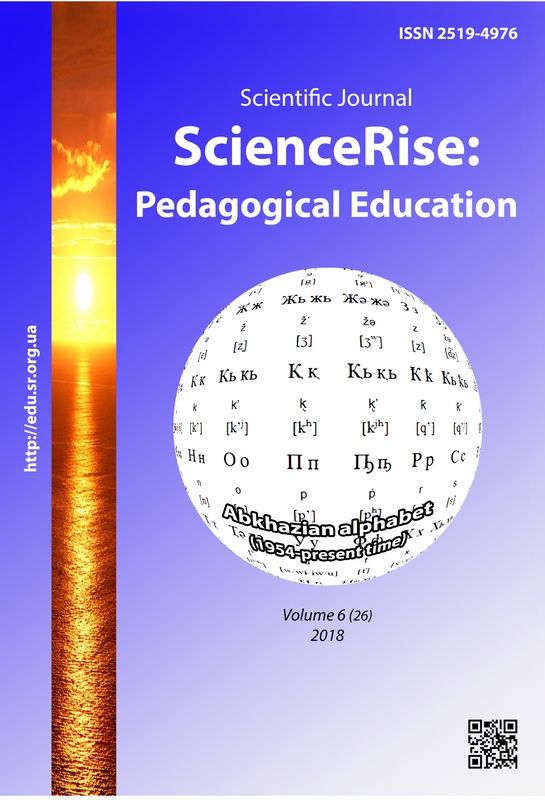Experimental verification of the author's methodology for the development of multinational staff officers` communicative competency
DOI:
https://doi.org/10.15587/2519-4984.2018.143351Keywords:
communicative competency, multinational staff officer, methodology, experimental verification, pedagogical experimentAbstract
The article is devoted to the experimental verification of the author's methodology for the development of the communicative competency of multinational staff officers in the process of their military-professional training for the participation in international peace and security operations. The program of the experimental research, peculiarities of carrying out the pedagogical experiment, results of the experimental verification of the author's methodology have been covered.
The experimental study has been carried out in accordance with the experimental work program, which includes the analytical-summative, analytical-research, research-experimental and final-generalizing stages, and contains a list of activities planned for the implementation.
The specificity of the multinational staff officers` military training for the participation in international peace and security operations has led to carrying out a consistent pedagogical experiment aimed at identifying significant differences in the levels of development of officers` communicative competency, based on substantiated criteria and indicators in one experimental group before and after the formative phase of the pedagogical experiment. In the formation of the study sample, an all-encompassing sampling method has been used, which means that everyone of a relatively small actual sample has to be examined.
According to the results of the formative stage of the experiment, the positive influence of the author's methodology on the dynamics of the development of the student-officers` communicative competency has been proved. After the approbation of the author's methodology, the number of students with a high level of development of communicative competency has increased by 37.3%, and the number of students with a sufficient level – by 16%. At the same time, the number of students with a satisfactory level decreased by 41.3%. All students with a low level at the summative stage of the experiment moved to higher levels of development of their communicative competency. The integral coefficient of the development of the communicative competency of student-officers in the experimental group after the formative stage of the experiment (3.41) has increased by 1.03 in comparison with the indicator at the summative stage (2.38).
By calculating the reliability of the experimental data on the T-criterion of Wilcoxon, it has been found that the indicators after the formative stage of the pedagogical experiment exceed the values of the indicators at the summative stage. This made it possible to conclude that the implementation of the author's methodology for the development of the communicative competency of multinational staff officers has had a positive impact on the growth of the coefficient of its development
References
- Radvanskyi, A. I. (2012). Formuvannia linhvosotsiokulturnoi kompetentnosti maibutnikh ofitseriv pravookhoronnykh orhaniv. Khmelnytskyi, 16.
- Mamonova, O. I. (2015). Kontekstna model profesiino spriamovanoi movnoi pidhotovky maibutnikh pravookhorontsiv. Starobilsk, 22.
- Nazarenko, V. O. (2007). Psykholohichni umovy rozvytku komunikatyvnoi kompetentnosti kerivnykiv Derzhavnoi prykordonnoi sluzhby. Khmelnytskyi, 226.
- Chernova, S. V. (2013). Metodychni rekomendatsii naukovo-pedahohichnomu skladu shchodo rozvytku profesiinoi komunikatyvnoi kompetentnosti ofitseriv-prykordonnykiv u protsesi pidvyshchennia kvalifikatsii. Molod i rynok, 12 (107), 120–125.
- Iefimova, O. M. (2014). Formuvannia inshomovnoi komunikatyvnoi kompetentnosti kursantiv vyshchykh viiskovykh navchalnykh zakladiv. Kyiv, 29.
- Lozynskyi, O. P. (2015). Problema pidvyshchennia profesiinoi komunikatyvnoi kompetentnosti maibutnoho ofitsera. Naukovi zapysky Natsionalnoho universytetu «Ostrozka akademiia». Seriia «Filolohichna», 52, 160–162.
- Lahodynskyi, O. S. (2007). Anhlomovna kompetentnist u movlenni yak obiekt kvalifikatsiinoho testovoho diahnostuvannia viiskovykh fakhivtsiv. Problemy inzhenerno-pedahohichnoi osvity, 18/19, 89–97.
- Luzan, P. H., Sopivnyk, I. V., Vyhovska, S. V. (2010). Osnovy naukovo-pedahohichnykh doslidzhen. Kyiv: NAKKKiM, 270.
- Pro zatverdzhennia Instruktsii z pidhotovky ta zastosuvannia natsionalnykh kontynhentiv, natsionalnoho personalu v mizhnarodnykh operatsiiakh z pidtrymannia myru i bezpeky (2016). Nakaz Ministerstva oborony Ukrainy No. 23. 18.01.2016. Verkhovna Rada Ukrainy: ofits. sait. Available at: http://zakon2.rada.gov.ua/laws/show/z0206-16 Last accessed: 06.12.2016
- Kuzmenko, T. M. (2010). Sotsiolohiia. Kyiv: Tsentr uchbovoi literatury, 320.
- Sidorenko, E. V. (2006). Metody matematicheskoy obrabotki v psikhologii. Saint Petersburg: Rech. 350.
Downloads
Published
How to Cite
Issue
Section
License
Copyright (c) 2018 Natalia Shalyhina

This work is licensed under a Creative Commons Attribution 4.0 International License.
Our journal abides by the Creative Commons CC BY copyright rights and permissions for open access journals.
Authors, who are published in this journal, agree to the following conditions:
1. The authors reserve the right to authorship of the work and pass the first publication right of this work to the journal under the terms of a Creative Commons CC BY, which allows others to freely distribute the published research with the obligatory reference to the authors of the original work and the first publication of the work in this journal.
2. The authors have the right to conclude separate supplement agreements that relate to non-exclusive work distribution in the form in which it has been published by the journal (for example, to upload the work to the online storage of the journal or publish it as part of a monograph), provided that the reference to the first publication of the work in this journal is included.







